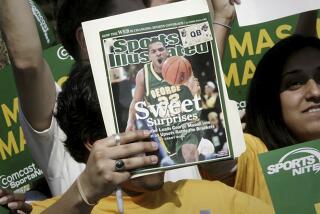Scientific Free Fall
- Share via
It’s a shame that science magazines for the general public, which got off to a rousing start six years ago, have fallen on hard times and have started to disappear. Science 86 from the American Assn. for the Advancement of Science has been gobbled up by Time Inc.’s Discover. Scientific American is being sold after having suffered a 50% decline in advertising pages since 1981.
What happened? Back in 1980 these magazines were all the rage. The idea was that they would deliver to advertisers the right kind of “demographics”--young, intelligent, upscale readers with plenty of disposable income. Things didn’t turned out that way. Though the magazines have impressive circulations (Discover sells more than 850,000 copies a month, Science 86 about 700,000, and Scientific American between 500,000 and 600,000), advertisers have been flocking from them in droves.
A new conventional wisdom now says that there are cheaper ways to reach these readers. The American Assn. for the Advancement of Science, which lost more than $1 million on Science 86 in the last year, described the drop in advertising as “a free fall with no end in sight.” Rather than continue to bear such losses, it sold out to Time, which promptly closed the magazine, having spent $5.7 million just for the subscriber list.
The troubling part in all this is that these magazines are very good, and in an age of science they are important. Though Scientific American has become more specialized and demanding over the years, the popular magazines have been pegged to the serious, interested non-scientist. They are readable, sober and informative, and they make extensive use of graphics to help get their ideas across.
Why can’t quality publications with respectable circulations and dedicated readerships make money? The advertising folks no doubt have plenty of answers, and some of them may even be true. No matter what the reason, the world is poorer for the loss of Science 86. We hope that no others follow it to oblivion.
More to Read
Inside the business of entertainment
The Wide Shot brings you news, analysis and insights on everything from streaming wars to production — and what it all means for the future.
You may occasionally receive promotional content from the Los Angeles Times.








